BY SUSAN ROSE
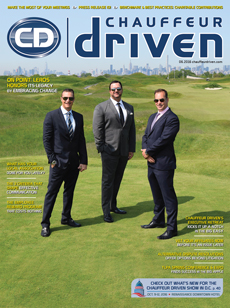 Cover Art: Leros’ Chris Nyikos, Mike Basso, and Jeff Nyikos at Trump Golf Links at Ferry Point, overlooking the Manhattan skyline. Photography by Chris Weiss. If there’s a single constant to living and working in the New York City metropolitan area, it’s that it’s constantly changing. What was true yesterday might not be a minute from now. This daily flux provides a good training ground for a luxury ground transportation provider that, by nature, has to roll with any number of challenges it’s facing at the moment: a chauffeur with a flat tire, a client’s late-arriving flight, crushing traffic, Uber.
Cover Art: Leros’ Chris Nyikos, Mike Basso, and Jeff Nyikos at Trump Golf Links at Ferry Point, overlooking the Manhattan skyline. Photography by Chris Weiss. If there’s a single constant to living and working in the New York City metropolitan area, it’s that it’s constantly changing. What was true yesterday might not be a minute from now. This daily flux provides a good training ground for a luxury ground transportation provider that, by nature, has to roll with any number of challenges it’s facing at the moment: a chauffeur with a flat tire, a client’s late-arriving flight, crushing traffic, Uber.
Just north of the city in Westchester County—between the Hudson River and Connecticut—Valhalla, N.Y.-based Leros Point to Point has achieved over three decades of success by being agile and flexible. It has to be: It’s weathered the highest of the New York highs, as well as some of her hardest moments ... and everything in between in the past 33 years. But that’s the beauty of NYC: there’s always a rebirth.
The vicissitudes in chauffeured transportation, especially regarding the consumer’s appetite for different types of vehicles, pressure to keep rates the same or lower them, and how they book service, have been swift and frequent in the last decade—including the sunset of the traditional limousine to the addition of shuttles and motorcoaches to fleets. Leros President Jeff Nyikos likens it to the impact that online booking portals such as Travelocity and Expedia had on travel agents.
“Travel agencies did not go completely away; they are just booking travel differently. They are booking excursions to Africa and other adventure trips. They’re booking a lot of cruises and trips to Europe. Whatever you’re into, they can find and book it. That’s the mindset we need to apply to the transportation industry, and you need to find your niche in the transportation industry because what you’re doing today to make money, you might not be doing in three years,” he says. “You have to know your market and sometimes get creative. It could be as simple as running a shuttle from one location to another—and not necessarily a corporate shuttle. Everyone knows that the game is changing. It doesn’t mean that the game is over; it’s just that you have to play it differently.”
Everyone knows that the game is changing. It doesn’t mean that the game is over; it’s just that you have to play it differently. ” – Jeff Nyikos, President of Leros Point to Point
Even from the very beginning, Leros has been different. Back in the heyday of the limousine, the company was founded by John Nyikos and his business partner, Lonnie Lehrer, to tap into the market for corporate executive transportation—and it was a smart move. New York is home to more than 70 Fortune 1000 companies, but add in a handful in Westchester County, and more in North Jersey and Connecticut, and the list easily tops 100. With the convergence of so many transportation options by land, air, and sea in the tristate area, chauffeured transportation was a necessary cog in that wheel for traveling professionals to and from the Big Apple. The proximity would later help them build a national affiliate network.
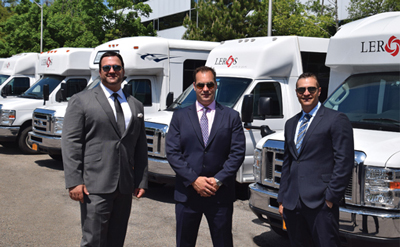 The Leros management team (L to R): COO Mike Basso, President Jeff Nyikos, and CFO Chris Nyikos at their new facility in Valhalla, N.Y. Pivoting to accommodate corporate clients opened a niche market that has since become one of its most profitable over the past 15 years: corporate shuttles. “The client asked for an employee shuttle to and from the train station as part of an RFP and we decided to go for it,” Jeff says. While Leros was in the position to do so, he warns that it’s not for everyone. “We’re lucky that we had the parking, but it takes a tremendous amount, not to mention that you’re dealing with the Department of Transportation. There’s a process that has to be managed in order to be successful, and I think it’s harder for a small operator to get involved on that side.”
The Leros management team (L to R): COO Mike Basso, President Jeff Nyikos, and CFO Chris Nyikos at their new facility in Valhalla, N.Y. Pivoting to accommodate corporate clients opened a niche market that has since become one of its most profitable over the past 15 years: corporate shuttles. “The client asked for an employee shuttle to and from the train station as part of an RFP and we decided to go for it,” Jeff says. While Leros was in the position to do so, he warns that it’s not for everyone. “We’re lucky that we had the parking, but it takes a tremendous amount, not to mention that you’re dealing with the Department of Transportation. There’s a process that has to be managed in order to be successful, and I think it’s harder for a small operator to get involved on that side.”
Now owned solely by the Nyikos family—John and his sons, Jeff and Chris—the company has offices in New York, Connecticut, and New Jersey; more than 200 employees; and 250 vehicles, 175+ of which are the company’s. Jeff and Chris, CFO, run the daily operations of the company with COO Mike Basso; John has since retired and lives eight months of the year in Florida, although he’s briefed nearly every day and is part of any larger decisions. Jeff had worked for Leros part time in college and transitioned into a sales role when he joined the company on a full-time basis in 1993. Chris pursued a career in corporate America before deciding that he wanted to join the family business full time, which he did in 2000 during a strong growth period. Basso was hired to work in the dispatch department while he was attending college, but the job grew into a career as he went from operations manager to vice president of operations to COO. All were in their 20s and eager to learn.
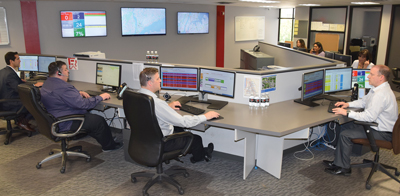 The Leros dispatch department Like most kids of the industry, Jeff was put to work by his father during school breaks—washing cars, answering phones, and stepping in wherever needed. Although he had plenty of experience with reservations and dispatch, he found that he had an affinity for sales, which was the avenue he pursued after graduating college and joining Leros in 1993. Over time, his role grew into marketing and branding, and later into overall operations as his father began to split his time between the office and other projects.
The Leros dispatch department Like most kids of the industry, Jeff was put to work by his father during school breaks—washing cars, answering phones, and stepping in wherever needed. Although he had plenty of experience with reservations and dispatch, he found that he had an affinity for sales, which was the avenue he pursued after graduating college and joining Leros in 1993. Over time, his role grew into marketing and branding, and later into overall operations as his father began to split his time between the office and other projects.
Chris, like his brother, also initially worked at the company during the summer. When he decided to make Leros a full-time career, he started in dispatch. “My brother was handling all of the sales and I needed to learn the operations side. It was a different time before we had all of this technology; it was a lot more hands-on and it was a great learning experience. If I never sat in those positions that these guys are sitting in, how could I ever run the business? I needed to know what they know, what they go through, and how hard it really is. I know what these guys are dealing with because I’ve been there.”
 L to R: Corporate Account Manager Bari Neuberger, Reservationist Payal Pandey, Affiliate Manager Jessi Harkins, Receptionist Erin Burke, Corporate Events and Social Media Manager Diana Vassallo, Special Events Manager Alekx Guzman, and Head of Reservations Kelcy Peterson Because they’ve worked together for so long and have become close personal friends, they’ve fallen into a rhythm with the division of power: Jeff focuses on the big picture, Chris keeps his eye on the financials, and Basso manages the office and overall operations. One of those “big picture” moves was the recent addition of a 55-passenger motorcoach to the Leros fleet, which also includes Lincoln MKTs and Town Cars, SUVs, Ford vans, and shuttle buses. “Purchasing a coach was a hedge for us,” says Jeff. “We’ve been running shuttles for 15 years, and we feel we can be successful with larger buses by doing things that traditional motorcoach companies don’t do or don’t really need to do. We’ve been looking into bus work with colleges and private schools, maybe even some retail work.” Jeff says he hopes to be able to capitalize on individual seats on the bus rather just selling the bus as a whole to a customer—possibly for a trip to a sporting event or concert. Right now, the company is about 70 percent corporate work and 30 percent shuttle.
L to R: Corporate Account Manager Bari Neuberger, Reservationist Payal Pandey, Affiliate Manager Jessi Harkins, Receptionist Erin Burke, Corporate Events and Social Media Manager Diana Vassallo, Special Events Manager Alekx Guzman, and Head of Reservations Kelcy Peterson Because they’ve worked together for so long and have become close personal friends, they’ve fallen into a rhythm with the division of power: Jeff focuses on the big picture, Chris keeps his eye on the financials, and Basso manages the office and overall operations. One of those “big picture” moves was the recent addition of a 55-passenger motorcoach to the Leros fleet, which also includes Lincoln MKTs and Town Cars, SUVs, Ford vans, and shuttle buses. “Purchasing a coach was a hedge for us,” says Jeff. “We’ve been running shuttles for 15 years, and we feel we can be successful with larger buses by doing things that traditional motorcoach companies don’t do or don’t really need to do. We’ve been looking into bus work with colleges and private schools, maybe even some retail work.” Jeff says he hopes to be able to capitalize on individual seats on the bus rather just selling the bus as a whole to a customer—possibly for a trip to a sporting event or concert. Right now, the company is about 70 percent corporate work and 30 percent shuttle.
Leros’ prime location in the New York City area has been an asset when capturing corporate work, but the team has continued to build upon those relationships through their longtime involvement with associations such as Meeting Planners International (MPI) and Global Business Travel Association (GBTA), where they have a booth at that group’s annual expo. Staying current on the trends of corporate travel is essential to survive in this market.
Technology has rapidly evolved how corporate travelers book service, and the economic downturn changed who does the booking—which has impacted how transportation companies sell their service to corporations. “Sadly, a lot of travel managers are losing their jobs and using a procurement department to make those decisions, which means it’s difficult to build and maintain relationships because it’s no longer a person. It’s a line item. You now have to work your way through an organization to get to the right person, if that person exists at all,” says Jeff. “We’re lucky because we’ve been around for a long time and already have relationships and connections with most of the businesses in the area; they already know our name. Breaking into newer corporations is more of a process if they don’t have a travel manager. That’s why it’s much easier to connect with a meeting planner at a networking event than a travel manager. Again, this is about thinking differently.”
Meetings and events aren’t immune to change, either, and he says that in general everything is moving faster because technology has made most things available instantly. “It used to be that meeting planners were booking a month or two out; now it’s more like a week if we’re lucky—and it’s big groups with a lot of vehicles. People want things now, and they will go where they can get it.” Jeff says.
2015 was an eventful one for Leros, especially CIO Frank Pirrone, as the company expanded its iLeros reservations app, migrated its reservation software to Santa Cruz, and moved into a larger facility about five minutes away from its older one. Pirrone—who manages everything to do with the company’s phones, website, and, and all things technical—is slowly but surely helping clients transition seamlessly from phone reservations to ones that are based online.
“The app works really well for our existing clients, and about 40 percent of reservations are coming from the app,” says Jeff. “Admins really like it because they can change a reservation in about 30 seconds from anywhere, and they can even manage transportation for multiple people within the company. I think the admins appreciate the app more than the actual traveler.”
The larger facility was necessary because of growth, both in staff and in fleet. Despite parking being at a premium in Westchester County, they were able to find a corporate park that had more than 200 vehicle spaces—and plenty of room for the larger vehicles, too.
The energetic and ambitious team that John Nyikos assembled in the ’90s has grown into a seasoned team of smart professionals who are now serving as leaders to the younger and newest members of the Leros workforce. Basso says that they are learning from each other. “The younger staff has reminded me that this really is a consumer world and how connected they are to technology, which has changed our business,” says Basso. “The consumer can find an alternative in a hurry. It used to be just one or two companies that someone knew through a friend or because someone recommended it, but now they can find an alternative in an instant with their phone. Plus, online reviews: I never realized how important online reviews were, but people absolutely do read them. We’re made a major push for our online presence as a result.”
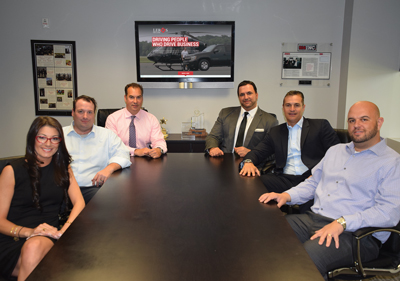 L to R: Kelcy Peterson, Director of Global Sourcing Liam Tobin, Jeff Nyikos, Mike Basso, Chris Nyikos, and CIO Frank Pirrone Their “work hard, play hard” axiom has permeated into core of the company, and that camaraderie is for real—they genuinely do work hard and then enjoy the occasional companywide happy hours or dinners. Office staff are often invited to weekend golfing or fishing trips, and the annual fantasy football league is a major hit that is open to everyone from upper management on down. Basso says that he makes it a point to hype each employee’s birthday—all of which serves a purpose.
L to R: Kelcy Peterson, Director of Global Sourcing Liam Tobin, Jeff Nyikos, Mike Basso, Chris Nyikos, and CIO Frank Pirrone Their “work hard, play hard” axiom has permeated into core of the company, and that camaraderie is for real—they genuinely do work hard and then enjoy the occasional companywide happy hours or dinners. Office staff are often invited to weekend golfing or fishing trips, and the annual fantasy football league is a major hit that is open to everyone from upper management on down. Basso says that he makes it a point to hype each employee’s birthday—all of which serves a purpose.
“What’s our secret? It’s consistency when everything around us is constantly changing. It’s an ally in our business because there is so much that is out of our control,” says Basso. “I concentrate on hiring people who will stick together. It’s easy to be high-fiving and loving each other when things are going well, but usually, when business starts to dip a bit, is when the finger-pointing starts. When you go through the lows, you stick with the people who help you weather the storm. Having that trust and familiarity with one another is a key factor—we know that we can count on the person down the line. I wish there was more time in the day where we could focus on the positive things they do; what goes wrong consumes our attention. I constantly try to fight that. Because of that, we do fun things together.”
“We have such a good crew in this office,” says Chris. “Not only are we on the management team all very close friends, but office staff are close friends as well. It’s a very enjoyable work environment.”
Over the years, Basso has come to rely on several key managers, some of whom have been with the company for a decade or longer. Fleet Manager Keith Holloway started as a chauffeur himself and was, in fact, Leros’ first employee in 1983. He now helps to manage the chauffeur team and fleet. Holloway also works with Chauffeur Manager Kevin Giaccone, who joined Leros about seven years ago after a career in health care. Tammy Weiss, head of auditing and billing, has been with the company for 20 years and corrals all of the moving parts within accounting. Director of Global Sourcing Liam Tobin, who was part of a company acquisition, is known as a jack of all trades amongst the management team and wears various hats. Vincent Nicoletti, head of dispatch, joined the Leros team about 15 years ago and actually went to high school with Tobin. Kelcy Peterson, head of reservations, helps Basso to focus on other critical areas of the company.
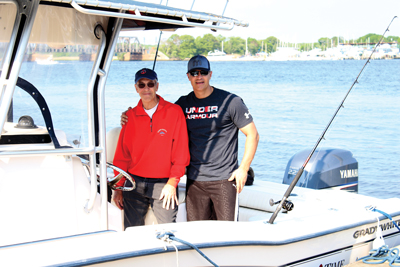 Leros Chairman John (left) and Chris Nyikos aboard John’s boat on the Long Island Sound “Mike does the hiring. We’ve always had a great team of people, but he’s put together a team that just clicks,” says Jeff. “Everyone knows what their role is. The business nearly runs itself on a daily basis because of the team that has been built.”
Leros Chairman John (left) and Chris Nyikos aboard John’s boat on the Long Island Sound “Mike does the hiring. We’ve always had a great team of people, but he’s put together a team that just clicks,” says Jeff. “Everyone knows what their role is. The business nearly runs itself on a daily basis because of the team that has been built.”
“To me, John [Nyikos] was always so humble and passed the credit to others, so when I took over running the office I wanted to make sure I continued to help maintain that type of culture,” says Basso. “Credit gets passed down; blame goes up. I think that type of environment helps in all relationships within our business, whether it’s driver to dispatcher or dispatcher to manager.”
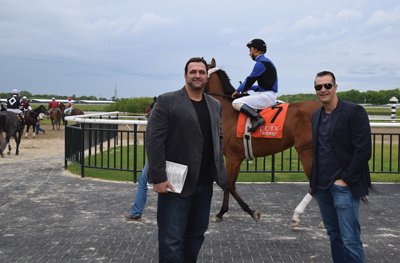 Mike Basso and Chris Nyikos have co-owned several race horses over the years, seen here at Parx Casino and Racing in Philadelphia Of course, “play hard” means that life outside the office is that much sweeter. Jeff and his wife Melissa have two teenage boys, and Jeff has been a coach of their lacrosse and football teams for years. Chris’ daughter and son are a bit younger, which keeps him and his wife Amy on their toes. Chris also loves to fish, which he does frequently with his father whenever the opportunity arises. Basso married his wife Kyla on New Years’ Eve in 2012, and both Chris and Jeff served as groomsmen. Basso played footall in college and, like Jeff, also coached. All are avid golfers and enjoy staying active in a variety of sports from skiing to softball. Chris and Basso are also horse racing enthusiasts and have been part owners in several race horses for years.
Mike Basso and Chris Nyikos have co-owned several race horses over the years, seen here at Parx Casino and Racing in Philadelphia Of course, “play hard” means that life outside the office is that much sweeter. Jeff and his wife Melissa have two teenage boys, and Jeff has been a coach of their lacrosse and football teams for years. Chris’ daughter and son are a bit younger, which keeps him and his wife Amy on their toes. Chris also loves to fish, which he does frequently with his father whenever the opportunity arises. Basso married his wife Kyla on New Years’ Eve in 2012, and both Chris and Jeff served as groomsmen. Basso played footall in college and, like Jeff, also coached. All are avid golfers and enjoy staying active in a variety of sports from skiing to softball. Chris and Basso are also horse racing enthusiasts and have been part owners in several race horses for years.
College football coach Eddie Robinson once said, “Leadership, like coaching, is fighting for the hearts and souls of men and getting them to believe in you,” and that on-the-field mentality is applicable to the business world as well. As athletes themselves, they understand that everyone relies on another if an organization is to be prosperous. If well executed, the client never has to see the incredible amount of work that is accomplished behind the scenes.
“There are three types of people: the A people who are always positive, the C people who are always negative, and the B people who can go either way. If you cater too much to the C people, then the A people will feel disenfranchised and eventually leave. It’s something I work on every day to ensure that I am commending people for the positive things that they do. Eventually those B people will become A people, and the C people will leave because they won’t have anyone to complain to,” says Basso. “I also subscribe to the idea that any problem in life and in business can be fixed with communication. If you can open those lines of communication with other things not just work, then everything else follows.” [CD0616]

